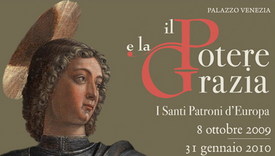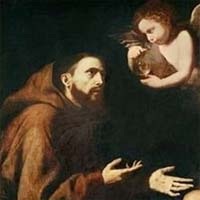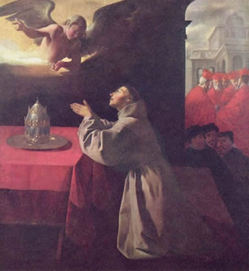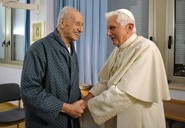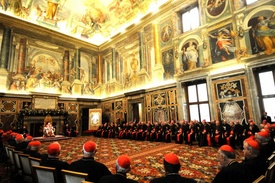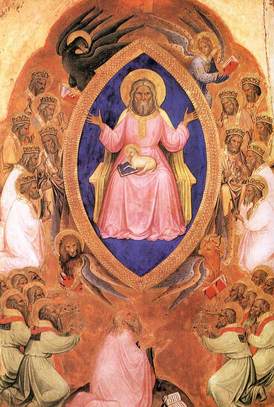Category: Pope Benedict XVI
Pope Benedict XVI’s monthly prayer intentions for February 2010
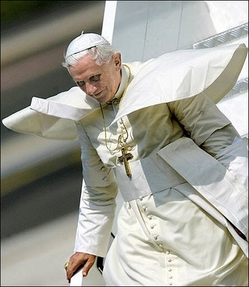 Pope Benedict asks us to keep in mind the following
Pope Benedict asks us to keep in mind the following
two intentions for the coming month of February. These intentions, as in our intentions offered in prayer show what Christ’s word means in all of its richness, the truth. He or she who prays understands, knows, does the will of God, as von Balthasar would say. So, pray for these intentions.
scholars and intellectuals, by sincere search for the truth, may come to know
the one true God.
missionary identity, may strive to follow Christ faithfully and to proclaim his
Gospel to all peoples.
The Mendicant witness of Christ and the Church is urgent & irresistible
The renewal of religious life is also one of Pope Benedict’s priorities. AND boy does it need it. The general state of religious life in this country at least, is circling the drain. Religious life’s sad state is not merely about gaining new recruits, or wearing habits or working with the marginalized, but being faithful to Christ and the Church today, not some fantasy of what one “guru” hopes the Church to be. There are notable exceptions to this evaluation, but even those orders getting vocations there are concerns with the institutional rot in the ranks, and therefore they are fragile. Benedict’s general audience address yesterday shows us the breadth and depth of the work needed to be done AND the desire to see the mendicant life thrive and contribute to the upbuilding of the Kingdom. Being faithful to the charism of the order and to the Magisterium of the Church are essential components to any hope of renewal. The Pope said:
At the beginning of the new year, we look at the history of Christianity, to see how a history develops and how it can be renewed. In it we can see that it is the saints, guided by the light of God, who are the genuine reformers of the life of the Church and of society. Teachers by their word and witnesses with their example, they know how to promote a stable and profound ecclesial renewal, because they themselves are profoundly renewed, they are in contact with the true novelty: the presence of God in the world.
Such a consoling reality — that in every generation saints are born and bear the creativity of renewal — constantly accompanies the history of the Church in the midst of the sorrows and the negative aspects of her journey. We also see come forth, century by century, the forces of reform and of renewal, because the novelty of God is inexorable and always gives new strength to go forward.
This was what happened in the 13th century, with the birth and the extraordinary development of the Mendicant Orders: a model of great renewal in a new historic period. They were called thus because of their characteristic of “begging,” namely, of going to the people humbly for economic support to live the vow of poverty and to carry out their evangelizing mission. Of the Mendicant Orders that arose in that period, the most notable and most important are the Friars Minor and the Preaching Friars, known as Franciscans and Dominicans. They have these names because of their founders, Francis of Assisi and Dominic de Guzmán, respectively. These two great saints had the capacity to wisely read “the signs of the times,” intuiting the challenges that the Church of their time had to face.
A first challenge was represented by the spread of several groups and movements of faithful that, although inspired in a legitimate desire for authentic Christian life, often placed themselves outside of ecclesial communion. They were in profound opposition to the rich and beautiful Church that developed precisely with the flourishing of monasticism. In recent catecheses I reflected on the monastic community of
This brought about the so-called pauper movements of the Medieval Age. They harshly contested the lifestyles of priests and monks of the time, accused of having betrayed the Gospel and of not practicing poverty as the first Christians, and these movements counterpoised to the ministry of the bishops their own “parallel hierarchy.” Moreover, to justify their choices, they spread doctrines that were incompatible with the Catholic faith. For example, the movement of the Cathars or Albigensians proposed again old heresies, such as depreciation and contempt of the material world — opposition to wealth quickly became opposition to material reality as such — the negation of free will, and then dualism, the existence of a second principle of evil equated with God. These movements had success, especially in
With an altogether original choice in the history of consecrated life, the members of these orders not only gave up possession of personal goods, as monks had since antiquity, but even wanted real estate and goods put in the name of the community. In this way they intended to give witness of an extremely sober life, to be in solidarity with the poor and trust only in
And fruits were not lacking: The poor groups that had separated from the Church returned to ecclesial communion or, gradually, were re-dimensioned until they disappeared. Also today, though living in a society in which “having” often prevails over “being,” there is great sensitivity to examples of poverty and solidarity, which believers give with courageous choices. Also today, similar initiatives are not lacking: movements, which really begin from the novelty of the Gospel and live it radically today, putting themselves in God’s hands, to serve their neighbor. The world, as Paul VI recalled in Evangelii Nuntiandi, willingly listens to teachers when they are also witnesses. This is a lesson that must never be forgotten in the endeavor of spreading the Gospel: to live first of all what is proclaimed, to be a mirror of divine charity.
Franciscans and Dominicans were witnesses, but also teachers. In fact, another widespread need in their time was that of religious instruction. Not a few lay faithful, who lived in greatly expanding cities, wished to practice a spiritually intense Christian life. Hence they sought to deepen their knowledge of the faith and to be guided in the arduous but exciting path of holiness. Happily, the Mendicant Orders were also able to meet this need: the proclamation of the Gospel in simplicity and in its depth and greatness was one objective, perhaps the main objective of this movement. In fact, with great zeal they dedicated themselves to preaching. The faithful were very numerous, often real and veritable crowds, which gathered to hear the preachers in the churches and in places outdoors — let us think of St. Anthony, for example. They dealt with themes close to the life of the people, especially the practice of the theological and moral virtues, with concrete examples, easily understood. Moreover, they taught ways to nourish the life of prayer and piety. For example, the Franciscans greatly spread devotion to the humanity of Christ, with the commitment of imitating the Lord. Hence it is not surprising that the faithful were numerous, women and men, who chose to be supported in their Christian journey by the Franciscan and Dominican friars, sought after and appreciated spiritual directors and confessors.
Thus were born associations of lay faithful that were inspired by the spirituality of Sts. Francis and Dominic, adapted to their state of life. It was the Third Order, whether Franciscan or Dominican. In other words, the proposal of a “lay sanctity” won many people. As the Second Vatican Council recalled, the call to holiness is not reserved to some, but is universal (cf. Lumen Gentium, 40). In every state of life, according to the needs of each, there is the possibility of living the Gospel. Also today every Christian must tend to the “lofty measure of Christian life,” no matter what state of life he belongs to!
The importance of the Mendicant Orders grew so much in the Middle Ages that lay institutions, such as labor organizations, ancient corporations and even civil authorities, often took recourse to the spiritual consultation of members of such orders for the writing of their regulations and, at times, for the solution of internal and external opposition. The Franciscans and Dominicans became the spiritual leaders of the Medieval city. With great intuition, they put into practice a pastoral strategy adapted to the transformation of society. Because many people were moving from the countryside to the cities, they placed their monasteries no longer in rural but in urban areas. Moreover, to carry out their activity for the benefit of souls, it was necessary to move in keeping with pastoral needs.
With another altogether innovative choice, the Mendicant Orders abandoned the principle of stability, a classic of ancient monasticism, to choose another way. Friars and Preachers traveled from one place to another, with missionary zeal. As a consequence, they gave themselves an organization that was different from that of the majority of monastic orders. In place of the traditional autonomy that every monastery enjoyed, they gave greater importance to the order as such and to the superior-general, as well as to the structure of the provinces. Thus the mendicants were in general available for the needs of the universal Church. This flexibility made it possible to send friars more adapted to specific missions and the Mendicant Orders reached
Another great challenge was represented by the cultural transformations taking place at that time. New questions made for lively discussions in the universities, which arose at the end of the 12th century. Friars and Preachers did not hesitate to assume this commitment as well and, as students and professors, they entered the most famous universities of the time, founded centers of study, produced texts of great value, gave life to true and proper schools of thought, were protagonists of scholastic theology in its greatest period, and significantly influenced the development of thought.
The greatest thinkers, Sts. Thomas Aquinas and Bonaventure, were mendicants, operating in fact with this dynamism of the new evangelization, which also renewed the courage of thought, of dialogue between reason and faith. Today also there is a “charity of and in truth,” an “intellectual charity” to exercise, to enlighten intelligences and combine faith with culture. The widespread commitment of the Franciscans and Dominicans in the Medieval universities is an invitation, dear faithful, to make oneself present in places of the elaboration of learning, to propose, with respect and conviction, the light of the Gospel on the fundamental questions that concern man, his dignity, and his eternal destiny. Thinking of the role of the Franciscans and Dominicans in the Middle Ages, of the spiritual renewal they aroused, of the breath of new life that they communicated in the world, a monk says: “At that time the world was growing old. Two orders arose in the Church, from which it renewed its youth, like that of an eagle” (Burchard d’Ursperg, Chronicon).
Dear brothers and sisters, let us indeed invoke at the beginning of this year the Holy Spirit, eternal youth of the Church: May he make each one of us feel the urgency of giving a consistent and courageous witness of the Gospel, so that saints will never be lacking, who make the Church shine as a Bride always pure and beautiful, without stain and without wrinkle, able to attract the world irresistibly to Christ, to his salvation.
Benedict meets an admirer, Susanna Maiolo
At the end of the general audience today, Pope Benedict met privately, for a brief time, with Susanna Maiolo and 2 members of her family. You’ll recall the unpleasant incident of Ms Maiolo taking down the pope and a cardinal. Ms. Maiolo expressed her regret for what happened at the celebration of the night Mass for Christmas at St Peter’s Basilica, and for his part, the Holy Father gave her his forgiveness and expressed good wishes.
Pope Benedict XVI’s monthly prayer intentions for January 2010
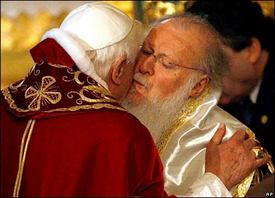 A new year, a new set of intentions given to us for our personal and communal prayer for the Pope and for the good of the Church. Saint Paul teaches to pray for the Church. And the Pope himself has reminded us that “He who prays does not waste time, even if the situation has all the markings of being an emergency and seems to push us toward action alone.” The intentions given to us have the great importance for our Christian life in our local context and for thriving of the Christian Way. Please be attentive to these intentions!
A new year, a new set of intentions given to us for our personal and communal prayer for the Pope and for the good of the Church. Saint Paul teaches to pray for the Church. And the Pope himself has reminded us that “He who prays does not waste time, even if the situation has all the markings of being an emergency and seems to push us toward action alone.” The intentions given to us have the great importance for our Christian life in our local context and for thriving of the Christian Way. Please be attentive to these intentions!
use modern means of social communication for their personal growth and to
better prepare themselves to serve society.
believer in Christ may be conscious that unity among all Christians is a condition
for more effective proclamation of the Gospel.
Benedict’s 2009 Christmas message to the world
Lux fulgebit hodie super nos, quia natus est nobis Dominus.
(A light will shine on us this day, the Lord is born for us.)
(Roman Missal, Christmas, Entrance Antiphon for the Mass at Dawn)
The liturgy of the Mass at Dawn reminded us that the night is now past, the day has begun; the light radiating from the cave of Bethlehem shines upon us.
The Bible and the Liturgy do not, however, speak to us about a natural light, but a different, special light, which is somehow directed to and focused upon “us”, the same “us” for whom the Child of Bethlehem “is born”. This “us” is the Church, the great universal family of those who believe in Christ, who have awaited in hope the new birth of the Savior, and who today celebrate in mystery the perennial significance of this event.
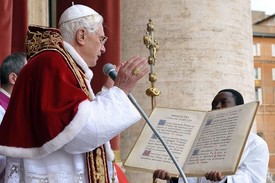 At first, beside the manger in Bethlehem, that “us” was almost imperceptible to human eyes. As the Gospel of Saint Luke recounts, it included, in addition to Mary and Joseph, a few lowly shepherds who came to the cave after hearing the message of the Angels. The light of that first Christmas was like a fire kindled in the night. All about there was darkness, while in the cave there shone the true light “that enlightens every man” (Jn 1:9). And yet all this took place in simplicity and hiddenness, in the way that God works in all of salvation history. God loves to light little lights, so as then to illuminate vast spaces. Truth, and Love, which are its content, are kindled wherever the light is welcomed; they then radiate in concentric circles, as if by contact, in the hearts and minds of all those who, by opening themselves freely to its splendour, themselves become sources of light. Such is the history of the Church: she began her journey in the lowly cave of Bethlehem, and down the centuries she has become a People and a source of light for humanity. Today too, in those who encounter that Child, God still kindles fires in the night of the world, calling men and women everywhere to acknowledge in Jesus the “sign” of his saving and liberating presence and to extend the “us” of those who believe in Christ to the whole of mankind.
At first, beside the manger in Bethlehem, that “us” was almost imperceptible to human eyes. As the Gospel of Saint Luke recounts, it included, in addition to Mary and Joseph, a few lowly shepherds who came to the cave after hearing the message of the Angels. The light of that first Christmas was like a fire kindled in the night. All about there was darkness, while in the cave there shone the true light “that enlightens every man” (Jn 1:9). And yet all this took place in simplicity and hiddenness, in the way that God works in all of salvation history. God loves to light little lights, so as then to illuminate vast spaces. Truth, and Love, which are its content, are kindled wherever the light is welcomed; they then radiate in concentric circles, as if by contact, in the hearts and minds of all those who, by opening themselves freely to its splendour, themselves become sources of light. Such is the history of the Church: she began her journey in the lowly cave of Bethlehem, and down the centuries she has become a People and a source of light for humanity. Today too, in those who encounter that Child, God still kindles fires in the night of the world, calling men and women everywhere to acknowledge in Jesus the “sign” of his saving and liberating presence and to extend the “us” of those who believe in Christ to the whole of mankind.
Wherever there is an “us” which welcomes God’s love, there the light of Christ shines forth, even in the most difficult situations. The Church, like the Virgin Mary, offers the world Jesus, the Son, whom she herself has received as a gift, the One who came to set mankind free from the slavery of sin. Like Mary, the Church does not fear, for that Child is her strength. But she does not keep him for herself: she offers him to all those who seek him with a sincere heart, to the earth’s lowly and afflicted, to the victims of violence, and to all who yearn for peace. Today too, on behalf of a human family profoundly affected by a grave financial crisis, yet even more by a moral crisis, and by the painful wounds of wars and conflicts, the Church, in faithful solidarity with mankind, repeats with the shepherds: “Let us go to Bethlehem” (Lk 2:15), for there we shall find our hope.
The “us” of the Church is alive in the place where Jesus was born, in the Holy Land, inviting its people to abandon every logic of violence and vengeance, and to engage with renewed vigour and generosity in the process which leads to peaceful coexistence. The “us” of the Church is present in the other countries of the Middle East. How can we forget the troubled situation in Iraq and the “little flock” of Christians which lives in the region? At times it is subject to violence and injustice, but it remains determined to make its own contribution to the building of a society opposed to the logic of conflict and the rejection of one’s neighbour. The “us” of the Church is active in Sri Lanka, in the Korean peninsula and in the Philippines, as well as in the other countries of Asia, as a leaven of reconciliation and peace. On the continent of Africa she does not cease to lift her voice to God, imploring an end to every injustice in the Democratic Republic of Congo; she invites the citizens of Guinea and Niger to respect for the rights of every person and to dialogue; she begs those of Madagascar to overcome their internal divisions and to be mutually accepting; and she reminds all men and women that they are called to hope, despite the tragedies, trials and difficulties which still afflict them. In Europe and North America, the “us” of the Church urges people to leave behind the selfish and technicist mentality, to advance the common good and to show respect for the persons who are most defenceless, starting with the unborn. In Honduras she is assisting in process of rebuilding institutions; throughout Latin America, the “us” of the Church is a source of identity, a fullness of truth and of charity which no ideology can replace, a summons to respect for the inalienable rights of each person and his or her integral development, a proclamation of justice and fraternity, a source of unity.
In fidelity to the mandate of her Founder, the Church shows solidarity with the victims of natural disasters and poverty, even within opulent societies. In the face of the exodus of all those who migrate from their homelands and are driven away by hunger, intolerance or environmental degradation, the Church is a presence calling others to an attitude of acceptance and welcome. In a word, the Church everywhere proclaims the Gospel of Christ, despite persecutions, discriminations, attacks and at times hostile indifference. These, in fact, enable her to share the lot of her Master and Lord.
Dear Brothers and Sisters, how great a gift it is to be part of a communion which is open to everyone! It is the communion of the Most Holy Trinity, from whose heart Emmanuel, Jesus, “God with us”, came into the world. Like the shepherds of Bethlehem, let us contemplate, filled with wonder and gratitude, this mystery of love and light! Happy Christmas to all!
Benedictus PP XVI, Christmas 2009
The search for God of all people, believers and non-believers concerns us, Pope said
The Holy Father’s annual address to the Roman Curia -the
Cardinals and bishops resident in Rome and other officials of the Roman Curia who assist him in
his governance of the Universal Church– took place yesterday. In it the Pope points to some notable concerns that he thinks that ought to be the concern of all
of us who believe faith is central our lives. Namely, belief and unbelief,
doubt and certainty and freedom with regard to God and humanity’s search for God. In my humble opinion, this papal address should be an essential point in any diocesan, parish or ecclesial movement’s pastoral plan in 2010 and beyond. In part the Holy Father said,
people who describe themselves as agnostics or atheists must be very important
to us as believers. When we talk about a new evangelization, these people may
become afraid. They do not want to see themselves as an object of mission, nor
do they want to renounce their freedom of thought or of will. But the question
about God nonetheless remains present for them as well, even if they cannot
believe in the concrete nature of his attention to us.
about the search for God as the fundamental motive from which Western
monasticism was born, and with it, Western culture. As the first step in
evangelization, we must try to keep this search alive; we must take pains that
man not set aside the question of God as an essential question of his
existence. Take pains that he accept this question and the longing concealed
within it.
Isaiah, that the temple should be a house of prayer for all peoples (cf. Isaiah
56:7; Mark 11:17). He was thinking about what was called the court of the
gentiles, which he cleansed of extraneous business so that it could be the
space available for the gentiles who wanted to pray to the one God there, even
if they could not take part in the mystery, for service of which the interior
of the temple was reserved.
meant the people who know God, so to speak, only from afar; who are
dissatisfied with their gods, rites, myths; who desire the Pure and the Great,
even if God remains for them the “unknown God” (cf. Acts 17:23). They
needed to be able to pray to the unknown God, and so be in relation with the
true God, although in the midst of obscurities of various kinds.
the Church should also open today a sort of “court of the gentiles”
where men can in some manner cling to God, without knowing him and before they
have found the entryway to his mystery, which the interior life of the Church
serves. To the dialogue with the religions it must above all add today a
dialogue with those for whom religion is something foreign, to whom God is
unknown, and who nonetheless would not like simply to remain without God, but
at least to approach him as the Unknown.
God Today: With Him or Without Him Everything Changes
Almost two weeks ago Pope Benedict sent a message to the president of the Italian Bishops’ Conference, Angelo Cardinal Bagnasco, who is chairing a meeting where the agenda is talking about God, of all things. Well, it beats talking about bishops, nuns and the environment all the time. This topic interests me not in the sense of mere curiosity but because it is taking seriously my seeking the face of God (this topic ought to concern all people who consider themselves Catholic, spiritual and/or religious). To say God interests me sounds like an academic exercise; it is and it is not entirely that. God is interesting to me because seeking God is like no other search I know of, for it concerns my entire self and it intersects all that I do in the world. Is God totally unknowable, the Mystery and desirous of a personal relationship with me (and you)? The Pope makes some great points in these few paragraphs. The curious points are emphasized below.
On the occasion of the Congress “God Today: With or
Without Him Everything Changes,” which is taking place in Rome from
December 10-12, I wish to express to you, venerated Brother, to the Italian
Episcopal Conference and, in particular, to the Committee for the Cultural
Project, my profound appreciation for this important initiative, which
addresses one of the great topics that has always fascinated and questioned the
human spirit.
The question of God is also central in our time, in which man is
often reduced to one dimension, the “horizontal,” considering
openness to the Transcendent as irrelevant for his life. The relationship with
God, instead, is essential for humanity’s journey and, as I have had the
occasion to affirm many times, the Church and every Christian, in fact, have
the task to make God present in this world, to attempt to open to men access to
God.
Planned from this perspective is the international event of these days.
The breadth of the approach to the important topic that characterizes the
meeting, will make possible the sketching of a rich and articulated picture of
the question of God, but above all it will be a stimulation for a profound
reflection on God’s place in the culture and life of our time.
On one hand, in
fact, an attempt is being made to show the different ways that lead to
affirming the truth about the existence of God, that God which humanity has
always known in some way, even in the chiaroscuro of his history, and who
revealed himself with the splendor of his face in the covenant with the people
of Israel and, beyond that, in every measure and hope, in a full and definitive
way, in Jesus Christ.
He is the Son of God, the Living who enters into the life
and history of man to illumine him with his grace, with his presence. On the
other hand, the desire is precisely to bring to light the essential importance
that God has for us, for our personal and social life, for understanding
ourselves and the world, for the hope that illumines our way, for the salvation
that awaits us beyond death.
Directed to these objectives are the numerous
interventions, according to the many points of view which will be the object of
study and exchange: from philosophical and theological reflection on the
witness of the great religions; from the impulse to God, which finds its
expression in music, literature, the figurative arts, the cinema and
television; to the development of the sciences, which attempt to read in depth
the mechanisms of nature, fruit of the intelligent work of God the Creator; from
the analysis of the personal experience of God to the consideration of the
social and political dynamics of an already globalized world.
In a cultural and
spiritual situation such as the one we are living in, where the tendency grows
to relegate God to the private sphere, to consider him irrelevant and
superfluous, or to reject him explicitly, it is my heartfelt hope that this
event might at least contribute to disperse that semi-darkness that makes
openness to God precarious and fearful for the men of our time, though he never
ceases to knock on our door.
The experiences of the past, although not remote
to us, teach us that when God disappears from man’s horizon, humanity loses its
direction and runs the risk of taking steps to its own destruction. Faith in
God opens man to the horizon of certain hope, which does not disappoint; it
indicates a solid foundation on which to base life without fear; it calls for
abandoning oneself with confidence in the hands of the Love which sustains the
world.
To you, cardinal, to all those who have contributed to prepare this
congress, to the speakers and to all the participants I express my cordial
greeting with the desire for the full success of the initiative. I support the
works with prayer and with my apostolic blessing, propitiator of that light
from on High, which makes us capable of finding God, our treasure and our hope.
Pope Benedict XVI’s monthly prayer intentions for December 2009
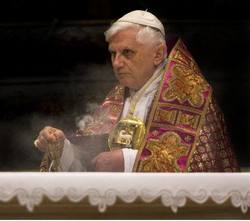 Pope Benedict has asked us to pray for these two intentions for the month of December. So, our prayer is united with his before the Divine Majesty asking that His Will be done and for these two points of intercession.
Pope Benedict has asked us to pray for these two intentions for the month of December. So, our prayer is united with his before the Divine Majesty asking that His Will be done and for these two points of intercession.
The general intention
That children may be respected, loved, and never exploited.
The missionary intention
That during Christmas the peoples of the earth may recognize the Incarnate Word as the light that illuminates every person, and that every nation may open its doors to Christ, the Savior of the world.
Have you connected with the Apostleship of Prayer? It is a good organization to link yourself to: faithful to the Gospel and Church
Pope calls for prayers and care for those living with HIV/AIDS
This coming December 1 the World AIDS Day will be
observed. My thought and my prayer go to all persons affected by this sickness,
in particular children, to the poorest and to those who are rejected. The
Church does not cease to combat AIDS, through her institutions and the
personnel dedicated to it. I exhort everyone to make their own contribution
with prayer and care, so that those who are affected by the HIV virus will feel
the presence of the Lord who gives support and hope. Finally, I hope that, by
multiplying and coordinating efforts, this sickness will be halted and
eradicated.
